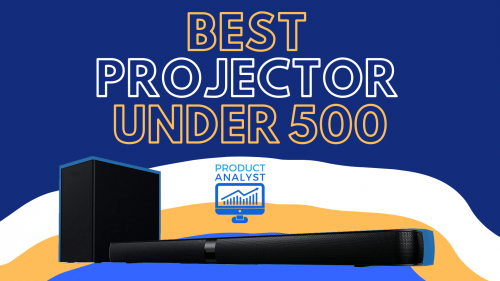
There are a lot of benefits to having a projector, and to get all the finer features such as a longer lamp life and a more optimal contrast ratio, one would expect to spend somewhere in the four figures.
However, our experts have found the best projectors under 500 that will still meet your standards at a lower cost.
Reviews of the Best Projectors Under $500
1. Epson Home Cinema 880
The incredibly bright lumens rating of 3300 is what gives this projector amazing color and white brightness. The full HD 1080p native resolution projector will deliver stunning image quality with advanced 3LCD projector technology.
The dynamic contrast ratio of 16,000:1 will enhance pictures shot in darker light.
The Epson Home Cinema 880 connects to all other devices via HDMI, allowing for an easy and hassle-free setup. The 880 is one of the options for a projector under 500 dollars for its robust design, longevity and performance.
There is even a skew sensor that instantly corrects the keystone when it detects slanted pictures without the need for manual adjustment.
Pros
- 3300 lumens
- Full HD native resolution
- 3LCD technology
- High contrast ratio of 16,000:1
- Low fan noise
- HDMI connection
- Keystone correction and skew sensor
- Flexible placement
Cons
- RCA may be faulty at times
- Warm fan
2. Epson VS250 SVGA
The Epson VS250 is the best projector for your media devices. It is highly compatible with your phones or tablets and supports HDMI connection. SVGA resolution is 800×600, which is ideal for business presentations and the small and lightweight profile is great for those on-the-go.
It’s also a great projector for outdoor movie nights and the correction feature will offer more placement flexibility in any environment.
The Epson VS250 projector can deliver an incredible 3200 lumens of brightness to enhance color and white brightness in any lighting condition. You can enlarge the picture size at will with the included zoom ring and ensure high resolution picture quality.
Pros
- One of the best projectors for outdoor viewing
- 3200 lumens
- Auto correction
- Zoom ring
- High compatibility with media devices
- SVGA picture quality
- Supports Dolby Audio
- Lightweight
- Easily portable
Cons
- No speaker hookup
- Takes time to set up for movies
3. WiMiUS P18 Projector
It’s difficult to find a full HD 1080p projector as cost-effective as this one. Even with a lower price tag, the WiMiUS P18 Projector still generates high quality picture, color brightness and color accuracy with superior precision and offers a higher color gamut.
The small projector has a high contrast ratio made possible by its LED lamp, which can deliver brightness and contrast comparable to real life in any environment.
The throw distance of 1.5-6 meters can classify this small projector as one with a short throw. The small and compact size makes it easy to move this projector around to different rooms when watching a movie.
Pros
- Affordable price
- Full HD 1080p
- Hi-Fi speakers built-in
- More color gamut
- Short throw distance
- Small size
- High quality LED lamp
- Great for watching movies
- Easy on the eyes with diffuse reflection imaging
- 3-year warranty
- Supports Dolby
- Long lamp life
Cons
- Not 4K or 8K
- Needs a long throw for 100-inch screen size
4. Vankyo V630W Projector
The Vankyo V630W projector offers Wi-Fi wireless connection. Wi-Fi outperforms Bluetooth by a mile in terms of connection reliability. The 5G Wi-Fi connection can ensure minimal to no lag during games or movies.
The native 1080p resolution projector features 4D keystone correcting to make sure you always get the best images. You can get a screen size of 300-inches with the proper throw range, but it could equal the need for a larger venue.
The Vankyo V630W is also highly compatible with multiple media devices with a variety of connections to expand your viewing options.
Pros
- Wi-Fi 5G connection enabled
- 4D keystone correcting
- Full 1080p HD resolution
- Screen mirroring option
- Wide screen of 300 inches
- Compatible with many devices
- HDMI
Cons
- Angled mounting can blur the edges of the screen
- No Bluetooth
5. Acer H5382BD 720P 3D DLP Home Theater Projector
Acer is known for computers, but they make an impressive home theater projector as well. The Acer H5382BD is a DLP projector that has superior brightness, contrast and resolution of LCD units. It’s not full HD, but only HD, which makes this projector a better option for smaller spaces or presentations.
With a wireless HD kit, you can transform the Acer projector into a wireless unit and eliminate the need for extra cables. The small projector also supports HDMI for high-definition connections to process content efficiently.
The projector also features an ambient light sensor, which can detect external lighting and optimize the settings to ensure the picture is not affected.
Pros
- DLP type of projector
- Ambient light sensor
- Acer’s ColorBoost3D technology
- Acer’s ColorBoost3D technology
- Can become wireless
- 3300 Ansi lumens
- 20,000:1 contrast ratio
- Native 720p HD resolution
- Easy setup and mount
Cons
- Not full HD resolution
- Zoom has to be reset before each session
Projectors Under 500 Buyer’s Guide
There are so many items to consider when you are looking for a projector. Other than one that’s best budget, different products and price ranges can offer different functions such as eco-mode and ANSI lumens ratings.
To help you narrow down your choices, our experts will dive deeper in features you may want in the best projector under 500.
Design and Build
The first thing to think about is the size. The size considerations pertain to the projector footprint and the size of the screen. Depending on your setup and the room size, the size of your LED projector or LCD projector will vary, but more on that in a bit.
What are you planning to use the projector for? A home theater optimized projector is best for watching movies, while a different type and one of lower quality will be enough for business presentations.
The purpose of the projector will also influence the price range and the placement. Our experts recommend ceiling-mountable models for a home theater. For presentations and graphics, a projector that is placed on a flat surface will suffice.
There are extra features that you can find in the best projector such as eco-mode which reduces energy consumption, and keystone correction.
The latter feature gives a projector the ability to correct the angle. For example, vertical keystone correction will right the angle when the projector is askew.
The feature of vertical keystone correction could factor into the cost of the projector, so if it’s an important characteristic to have, you may be looking at a higher price tag.
Projector Type
There are two leading types of projectors on the market today – an LCD and a DLP projector.
A DLP projector is known for higher resolution picture quality compared to its counterpart. They have high brightness and sharper images, which extend to fast-moving objects onscreen. For 3-dimensional realistic imaging, DLP is the way to go.
However, that’s not to say DLP projectors don’t have their disadvantages. A DLP model has issues with dark colors, especially in a well-lit room and you might encounter rainbow effects.
An LCD unit is not as bright, which can pose an issue with ambient light. It’s also because of the higher color brightness seen in the DLP that raises the issue of dark color rendering, which is unseen in LCD units.
A major pro of LCD units is their price range. They are often more affordable than DLP projectors but the 3D pictures and fast-moving objects portrayed onscreen doesn’t match up to DLP models.
Is one really better than the other? Each video projector has its benefits and drawbacks, so depending on your application and purpose, one might be more suited to your needs than the other. For example, DLP is better for movies and Blu Ray content, while LCD is enough for presentations and slideshows.
Screen Size
A projector will have a maximum and minimum screen size it’s able to cast on the screen. The best projector under 500 dollars will need to match the screen or the surface you intend to cast the image onto. Measure the wall or white screen you purchased to decide on the best range.
However, the max and min screencasting will also depend on the throw range, which our experts will also cover in a bit. In short, the screen size will depend on how far or how close you place the projector to the screen or wall.
The screen size is an important feature to look for in a projector because it could affect the pictures if you go beyond the throw ratio.
Brightness, Contrast, Resolution
The brightness, contrast and resolution come together to create the image quality. For exceptional color accuracy and white brightness, you need to look at these characteristics. Working together, these figures will create the ultimate home entertainment experience.
Let’s start with the brightness. When turned up to the max, the brightness of a portable projector can give you eye fatigue and a headache. This is why simply turning up the backlight is not the solution in a well lit room. What you can do is determine the amount of ambient lighting that will be present in your viewing space to determine the brightness levels.
The brightness is measured in lumens, or ansi lumens, a more detailed lumens standard with ANSI standardization. Yes, in general a higher lumens rating in a portable projector will equal a brighter picture, but that doesn’t always mean better.
If you intend to watch movies in a dark room with no lighting, then something as low as 1000 lumens will be enough for your home theater. However, in a living room where floor-to-ceiling windows are present, you will need upwards of 3000 lumens from your projectors under 500 to combat the daylight.
3000 lumens for a pitch black room is not needed for the best projector under 500. If you go for a home theater projector this bright, the experience won’t be a pleasant one. Not to mention it might cost you extra cash you could have saved.
The next item to consider is the contrast. The contrast affects the realism of the colors and warmth and coolness they portray. The contrast ratio from the best projector under 500 needs to be optimal and not too extreme.
The contrast is the difference between the brightest and darkest colors in your content. 10,000:1 is our experts’ recommended standard, but the higher it is, the better.
You need to also factor in the ambient lighting and the location of your home theater projector to determine the contrast ratio.
Lastly, the resolution of a projectors under 500 is the most crucial point for picture quality. The better the resolution, the better quality the picture and images are.
It’s quite simple, the higher the number, the higher the resolution. Most of the best projectors under 500 will offer at least full HD 1080p resolution. Our experts also do not recommend going below this.
Remember to look for full HD and not just HD, because 720p is considered the baseline for high definition but still doesn’t compare to 1080p.
If you can find a projector under 500 that can bring you Blu Ray, 4K or even 8K quality content to the big screen, then definitely pick up that model.
Projector’s Throw Distance
Our team touched upon the throw distance above, but let’s explain it in more detail.
The throw range is the distance the projector is from the screen to cast the best quality picture, or the range the projector needs to be within without compromising visual clarity. It basically means how far you can distance the projector from the screen without going blurry.
To understand if the projector’s throw distance and throw ratio are suitable for your setup, you need to look at the placement and size of your room. To get a big screen size, your projector will need to be pretty far away. You can find options that have a throw range of 5 feet [1] all the way up to 30!
If you have a small room, a shorter throw ratio is recommended. If you plan on hosting movie nights outdoors, you will need to find a home theater projector under 500 with a longer throw ratio.
Lamp Life
The lamp life, sometimes referred to as bulb life, is how long the lamp can operate in your projectors before it needs replacing. Projectors with a long lamp life will make sure you get the most out of your money.
Projector lamps are costly components, which means a long lamp life will equal lower maintenance fees. Don’t worry, because even a basic bulb can offer you up to 10,000 hours of lamp life, but if you can find one with 15,000 hours, then our experts fully support this option. 15,000 hours can grant months and even years of happy movie nights.
The projector units we suggested on our top list plus the Epson VS355 projector and the Optoma hd143x all have long lamp lives to ensure a long lifespan.
Connections
Connectivity options are something many consumers forget. The right connections can offer reduced input latency, and contribute to a more efficient viewing experience.
There are wired and wireless connectivity options offered by projectors in the form of HDMI Bluetooth, and even Wi-Fi which are what our team strongly suggests.
There is no debating the convenience of Bluetooth, as it allows for a wireless setup. You can also stream and cast content wirelessly from your mobile devices with Bluetooth. Wi-Fi is another wireless option that is more reliable and stable than Bluetooth as it is not contingent upon the distance.
For Bluetooth to operate at optimal speeds for stability, you need to be within a range of at least 30 feet or less. Wi-Fi projectors connect directly to your home network. This means you can enjoy uninterrupted connection anywhere in your house as long as the Wi-Fi is strong and stable.
For 500 dollars or less, you want the best wired connection quality for the big screen, and HDMI is the connection that can offer that. Look for the HDMI port on the back of the unit. One of the best things about HDMI is the low latency and HD processing.
You may also find other wired connections on the back of your device, but for the highest quality content, our team always recommends the HDMI route.
FAQ
What is a good inexpensive projector?
The Epson Home Cinema 880 is a good inexpensive projector. This projector and the Optoma hd143x deliver stunning picture quality, throw and contrast ratio, and HDMI connectivity to get you set up and enjoying the ultimate home theater experience in no time at all.
Our Top Pick For a Projector Under 500: Epson Home Cinema 880
Our team’s top pick for best projector under 500 is the Epson Home Cinema 880. This projector can sense when the angle is tilted and angle it correctly. The throw ratio and high definition picture make the Epson Home Cinema 880 an excellent choice for movie content enjoyed at home.
It’s easy to set up and has a built-in speaker, saving you the hassle of hooking up external units. The projector is highly compatible with other devices and the 3300 lumens brightness paired with the 16,000:1 contrast ratio will improve your overall movie experience.
The post What is the Best Projector Under 500? Install the Best Budget Option for your Home Theater appeared first on The Product Analyst.
from The Product Analyst https://theproductanalyst.com/best-projector-under-500/
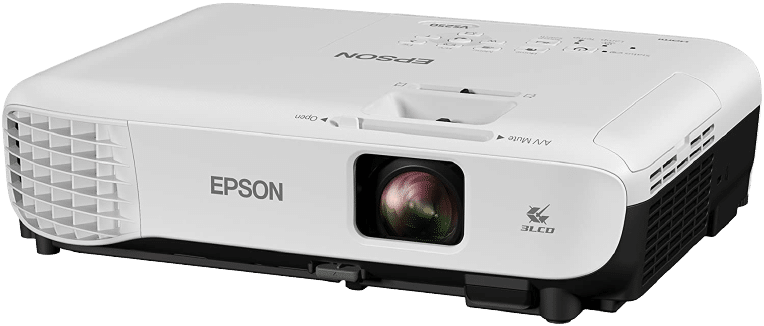
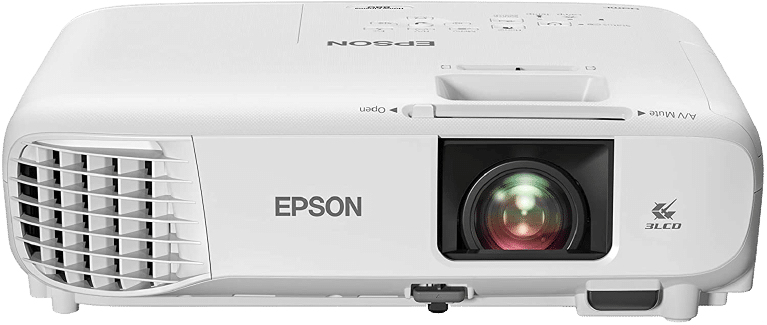
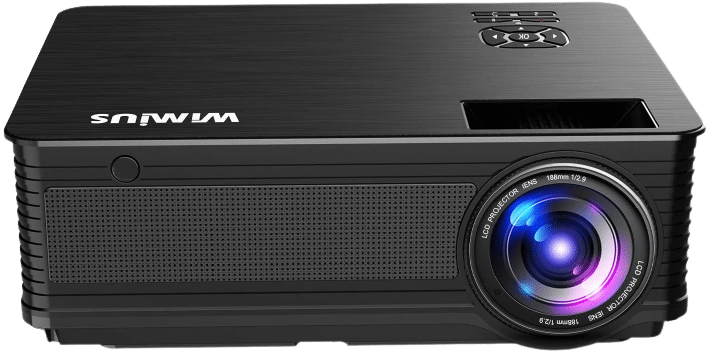
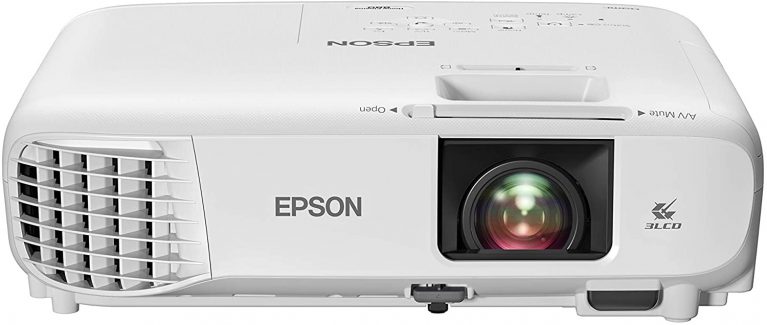
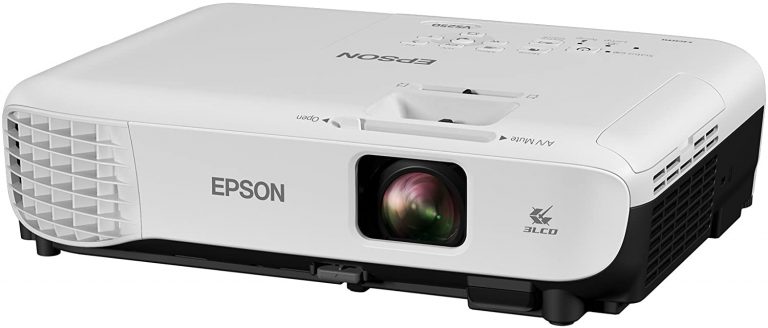
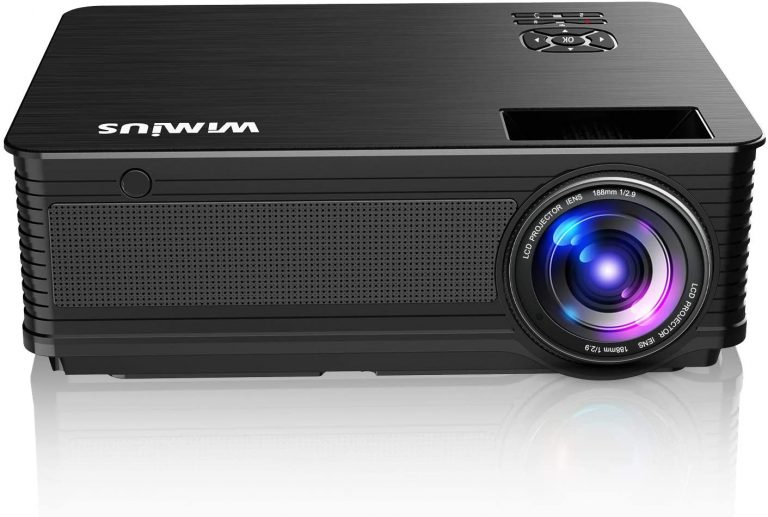
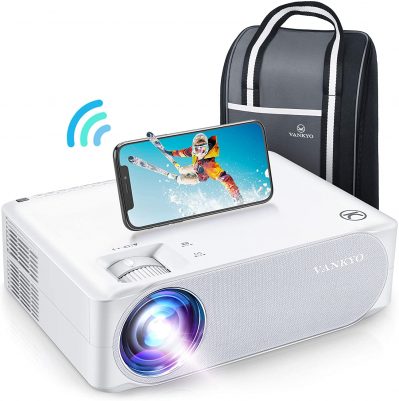
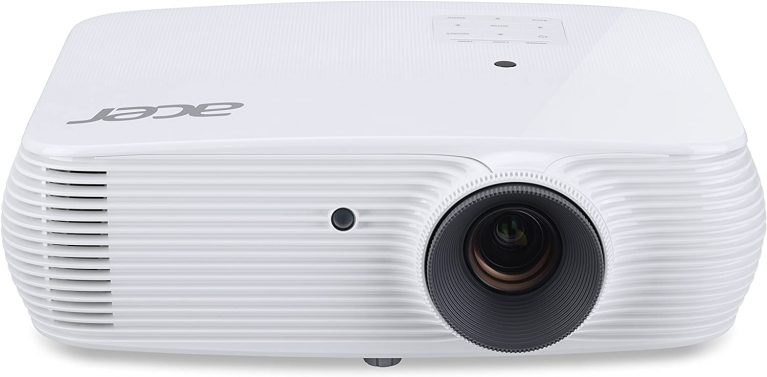
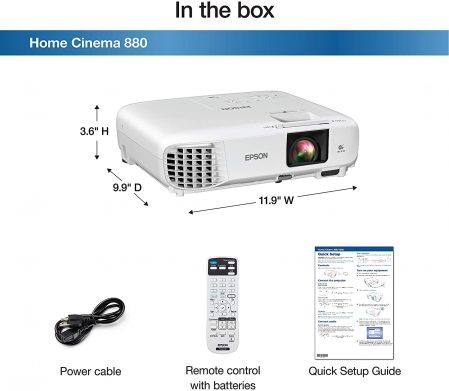
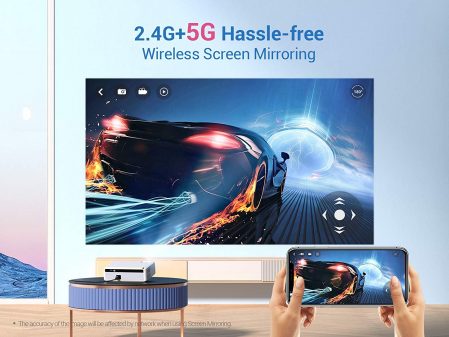
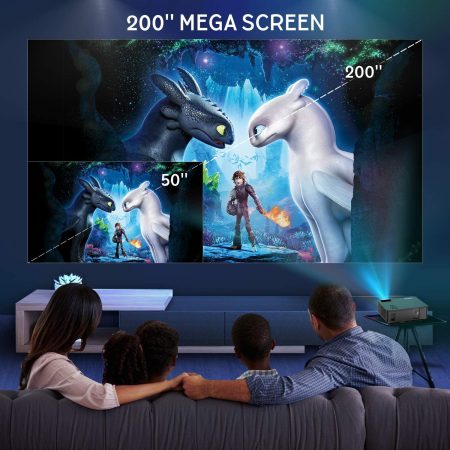
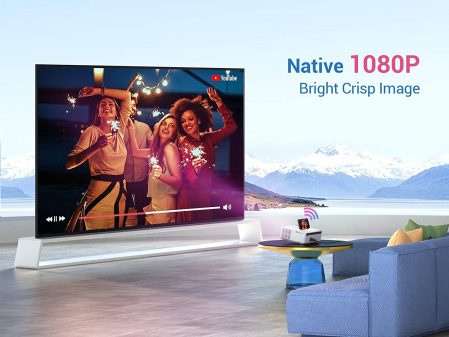
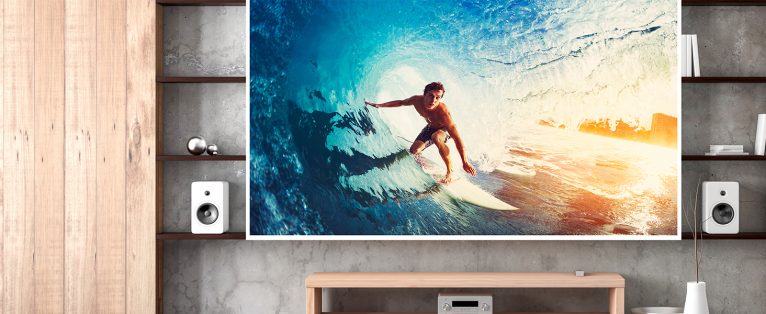

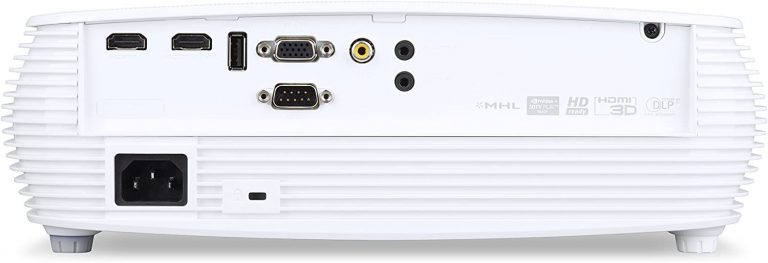
No comments:
Post a Comment